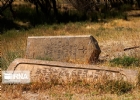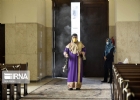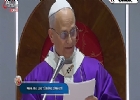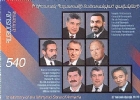
English :
24 Haziran 2020
![]()
![]()
![]()
World-Renowned Armenian Singer Onnik Dinkjian Awarded National Heritage Fellowship Award. - 
World-renowned Armenian folk and liturgical singer Onnik Dinkjian has been swarded the the prestigious 2020 National Endowment for the Arts Heritage Fellowship Award, per the National Endowment for the Arts.
As part of the National Endowment for the Arts’ work to support and celebrate our nation’s rich traditional arts heritage, the agency is announcing the 2020 recipients of its National Heritage Fellowships. These lifetime honor awards of $25,000 are given in recognition of both artistic excellence and efforts to sustain cultural traditions for future generations.
“Each year the Heritage Fellowships highlight the distinct living traditions of communities around our nation, as well as how our fellows instill a sense of pride, beauty, and cultural continuity through their art,” said Mary Anne Carter, chairman of the National Endowment for the Arts. “The National Endowment for the Arts is pleased to recognize these outstanding artists with a National Heritage Fellowship.”
Onnik Dinkjian is one of the most beloved and influential Armenian singers in America. Four generations have listened to his recordings and have treasured his singing at Armenian concerts, dances, weddings, and church services throughout the United States. Dinkjian’s tenor voice is soothing and expressive, conveying both the utter joy and passions of his Armenian heritage and the deep sorrow of its painful history.
Dinkjian was born in 1929 in Paris, France. His parents, born in Dikranagerd (Diyarbekir), Turkey, were survivors of the 1915 Armenian Genocide, and died when he was an infant. His godparents, also survivors of the genocide from Dikranagerd, adopted him and they immigrated to America in 1946. The Armenian dialect from Dikranagerd is unique and Dinkjian is one of the last remaining Armenians who speaks and understands it, and perhaps the last who sings in this endangered dialect.
Dinkjian’s earliest musical experiences were in the Armenian Church, where he became a featured soloist. Upon joining the U.S. Army in 1952, he became soloist of the famed Winged Victory Chorus, which entertained the troops throughout Europe during the Korean War.
Apart from the sacred music of the Armenian Church, Dinkjian’s repertoire consists of mainly folk and popular songs from the Anatolian (Eastern Turkey) villages, Armenia, and the Armenian Diaspora. Dinkjian is also a composer and lyricist, whose songs have become standards in the American-Armenian community.
Dinkjian made his first recording in 1948 on the Bat Masian label (78 rpm), followed by subsequent 78s, 45s, LPs, and CDs. His recordings quickly became bestsellers in the American-Armenian communities, which resulted in decades of live performances. Much of the repertoire heard at Armenian functions in America was learned from Onnik Dinkjian. He has continuously and generously spent time with young American-Armenian musicians, encouraging them to treasure their cultural identity by sharing their talent. Specifically, he has written out hard-to-decipher lyrics and guided young singers with lyric translations and proper diction.
İn 2009, Dinkjian was invited to do a concert in Diyarbekir, dramatically bringing the local Armenian folk songs back to their place of origin after having kept them alive for generations in America. Although there were virtually no Armenians present, he was welcomed and honored by the Kurdish and Turkish communities, as well as by the mayor. A documentary film titled Garod (Longing) was produced by Kurdish and Turkish filmmakers in recognition of this historic event.
Dinkjian has performed at the Library of Congress, the Smithsonian Folklife Festival, and the Kennedy Center’s Millennium Stage.
The 2020 National Heritage Fellows are (click on the links for full bios on the recipients): William Bell, Soul Singer and Songwriter from Atlanta, Georgia, Onnik Dinkjian, Armenian Folk and Liturgical Singer from Fort Lee, New Jersey, Zakarya and Naomi Diouf, West African Diasporic Dancers from Oakland/Castro Valley, California, Karen Ann Hoffman (Oneida Nation of Wisconsin), İroquois Raised Beadworker from Stevens Point, Wisconsin, Los Matachines de la Santa Cruz de la Ladrillera, Traditional Religious Dancers from Laredo, Texas, John Morris, Old-Time Fiddler and Banjo Player from İvydale, West Virginia, Suni Paz, Nueva Canción Singer and Songwriter from Henderson, Nevada, Wayne Valliere (Lac du Flambeau Ojibwe), Birchbark Canoe Builder from Waaswaaganing (Lac du Flambeau, Wisconsin), and Hugo N. Morales, Radio Producer and Radio Network Builder from Fresno, California
The National Heritage Fellowships are the nation’s highest honor in the folk and traditional arts. İncluding the 2020 class, the Arts Endowment has awarded 449 National Heritage Fellowships, recognizing artists working in more than 200 distinct art forms, including bluesman B.B. King, Cajun fiddler and composer Michael Doucet, sweetgrass basketweaver Mary Jackson, cowboy poet Wally McRae, Kathak dancer and choreographer Chitresh Das, and gospel and soul singer Mavis Staples.
Fellowship recipients are nominated by the public, often by members of their own communities, and then judged by a panel of experts in the folk and traditional arts. The panel’s recommendations are reviewed by the National Council on the Arts, which sends its recommendations to the Arts Endowment chairman, who makes the final decision.
Established by Congress in 1965, the National Endowment for the Arts is the independent federal agency whose funding and support gives Americans the opportunity to participate in the arts, exercise their imaginations, and develop their creative capacities. Through partnerships with state arts agencies, local leaders, other federal agencies, and the philanthropic sector, the Arts Endowment supports arts learning, affirms and celebrates America’s rich and diverse cultural heritage, and extends its work to promote equal access to the arts in every community across America. Visit arts.gov to learn more.
As part of the National Endowment for the Arts’ work to support and celebrate our nation’s rich traditional arts heritage, the agency is announcing the 2020 recipients of its National Heritage Fellowships. These lifetime honor awards of $25,000 are given in recognition of both artistic excellence and efforts to sustain cultural traditions for future generations.
“Each year the Heritage Fellowships highlight the distinct living traditions of communities around our nation, as well as how our fellows instill a sense of pride, beauty, and cultural continuity through their art,” said Mary Anne Carter, chairman of the National Endowment for the Arts. “The National Endowment for the Arts is pleased to recognize these outstanding artists with a National Heritage Fellowship.”
Onnik Dinkjian is one of the most beloved and influential Armenian singers in America. Four generations have listened to his recordings and have treasured his singing at Armenian concerts, dances, weddings, and church services throughout the United States. Dinkjian’s tenor voice is soothing and expressive, conveying both the utter joy and passions of his Armenian heritage and the deep sorrow of its painful history.
Dinkjian was born in 1929 in Paris, France. His parents, born in Dikranagerd (Diyarbekir), Turkey, were survivors of the 1915 Armenian Genocide, and died when he was an infant. His godparents, also survivors of the genocide from Dikranagerd, adopted him and they immigrated to America in 1946. The Armenian dialect from Dikranagerd is unique and Dinkjian is one of the last remaining Armenians who speaks and understands it, and perhaps the last who sings in this endangered dialect.
Dinkjian’s earliest musical experiences were in the Armenian Church, where he became a featured soloist. Upon joining the U.S. Army in 1952, he became soloist of the famed Winged Victory Chorus, which entertained the troops throughout Europe during the Korean War.
Apart from the sacred music of the Armenian Church, Dinkjian’s repertoire consists of mainly folk and popular songs from the Anatolian (Eastern Turkey) villages, Armenia, and the Armenian Diaspora. Dinkjian is also a composer and lyricist, whose songs have become standards in the American-Armenian community.
Dinkjian made his first recording in 1948 on the Bat Masian label (78 rpm), followed by subsequent 78s, 45s, LPs, and CDs. His recordings quickly became bestsellers in the American-Armenian communities, which resulted in decades of live performances. Much of the repertoire heard at Armenian functions in America was learned from Onnik Dinkjian. He has continuously and generously spent time with young American-Armenian musicians, encouraging them to treasure their cultural identity by sharing their talent. Specifically, he has written out hard-to-decipher lyrics and guided young singers with lyric translations and proper diction.
İn 2009, Dinkjian was invited to do a concert in Diyarbekir, dramatically bringing the local Armenian folk songs back to their place of origin after having kept them alive for generations in America. Although there were virtually no Armenians present, he was welcomed and honored by the Kurdish and Turkish communities, as well as by the mayor. A documentary film titled Garod (Longing) was produced by Kurdish and Turkish filmmakers in recognition of this historic event.
Dinkjian has performed at the Library of Congress, the Smithsonian Folklife Festival, and the Kennedy Center’s Millennium Stage.
The 2020 National Heritage Fellows are (click on the links for full bios on the recipients): William Bell, Soul Singer and Songwriter from Atlanta, Georgia, Onnik Dinkjian, Armenian Folk and Liturgical Singer from Fort Lee, New Jersey, Zakarya and Naomi Diouf, West African Diasporic Dancers from Oakland/Castro Valley, California, Karen Ann Hoffman (Oneida Nation of Wisconsin), İroquois Raised Beadworker from Stevens Point, Wisconsin, Los Matachines de la Santa Cruz de la Ladrillera, Traditional Religious Dancers from Laredo, Texas, John Morris, Old-Time Fiddler and Banjo Player from İvydale, West Virginia, Suni Paz, Nueva Canción Singer and Songwriter from Henderson, Nevada, Wayne Valliere (Lac du Flambeau Ojibwe), Birchbark Canoe Builder from Waaswaaganing (Lac du Flambeau, Wisconsin), and Hugo N. Morales, Radio Producer and Radio Network Builder from Fresno, California
The National Heritage Fellowships are the nation’s highest honor in the folk and traditional arts. İncluding the 2020 class, the Arts Endowment has awarded 449 National Heritage Fellowships, recognizing artists working in more than 200 distinct art forms, including bluesman B.B. King, Cajun fiddler and composer Michael Doucet, sweetgrass basketweaver Mary Jackson, cowboy poet Wally McRae, Kathak dancer and choreographer Chitresh Das, and gospel and soul singer Mavis Staples.
Fellowship recipients are nominated by the public, often by members of their own communities, and then judged by a panel of experts in the folk and traditional arts. The panel’s recommendations are reviewed by the National Council on the Arts, which sends its recommendations to the Arts Endowment chairman, who makes the final decision.
Established by Congress in 1965, the National Endowment for the Arts is the independent federal agency whose funding and support gives Americans the opportunity to participate in the arts, exercise their imaginations, and develop their creative capacities. Through partnerships with state arts agencies, local leaders, other federal agencies, and the philanthropic sector, the Arts Endowment supports arts learning, affirms and celebrates America’s rich and diverse cultural heritage, and extends its work to promote equal access to the arts in every community across America. Visit arts.gov to learn more.
Bu haber zartonkmedia kaynağından gelmektedir.
Haber metninde yer alan görüşler haber kaynağı (zartonkmedia) ve yazarına ait olup,
bolsohays.com sitesi haber hakkında herhangi bir görüş üstlenmemektedir.
Opinions expressed are those of the author(s)-(zartonkmedia). They do not purport to reflect the opinions or views of bolsohays.com
Diğer Haberler
-
Ohanian Becomes First Armenian-American to Receive Best Picture Oscar Nomination
-
Pashinyan Announces Beginning of Renewal of Armenian Apostolic Church
-
Azerbaijan-Armenia normalization push set to carry into 2026
-
Pashinyan Urges Karabakh Armenians to Embrace Armenian Citizenship for Security
-
Armenia adopts universal healthcare insurance
-
Armenia pays mothers $1,300 for each child born
-
Photography of Ancient Armenia Featured in New 2026 Wall Calendar
-
Pope asks for prayers ahead of visit to Türkiye and Lebanon
-
Armenia will step up its efforts toward membership in the European Union in 2026
-
Economy Minister discussed rebranding of Armenian brandy with producers
-
Aleppo - Yerevan - Aleppo
-
Mirzoyan: Armenia citizens should live in Armenia, Azerbaijan citizens should live in Azerbaijan
Foto Galeri Tüm Galeriler
Video Galeri Tüm Videolar
Anket Tüm Anketler
Günün Sözü
Անիրաւութիւն ընողներէն վրէժ լուծելու ամենալաւ միջոցն է անոնց պէս չըլլալը։


















